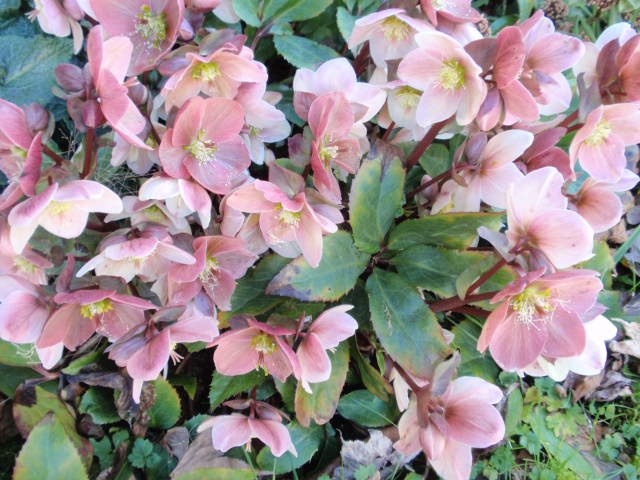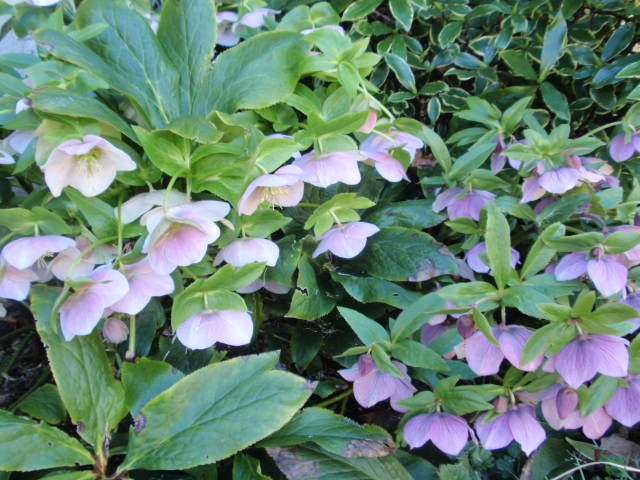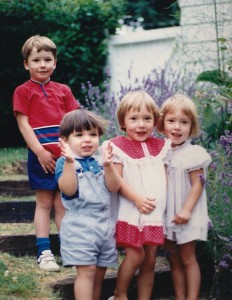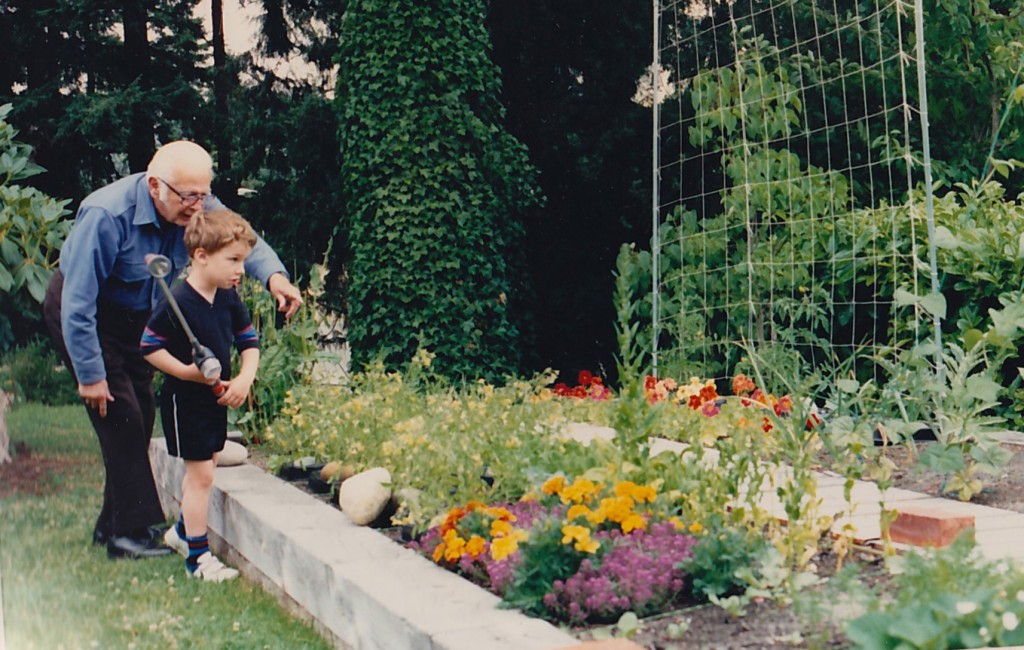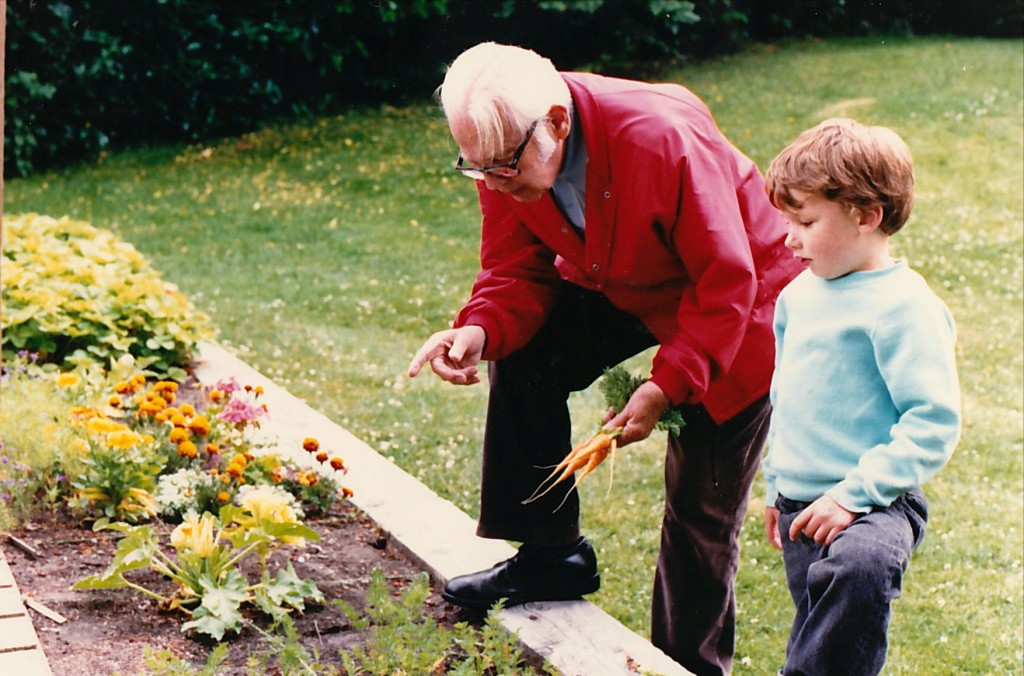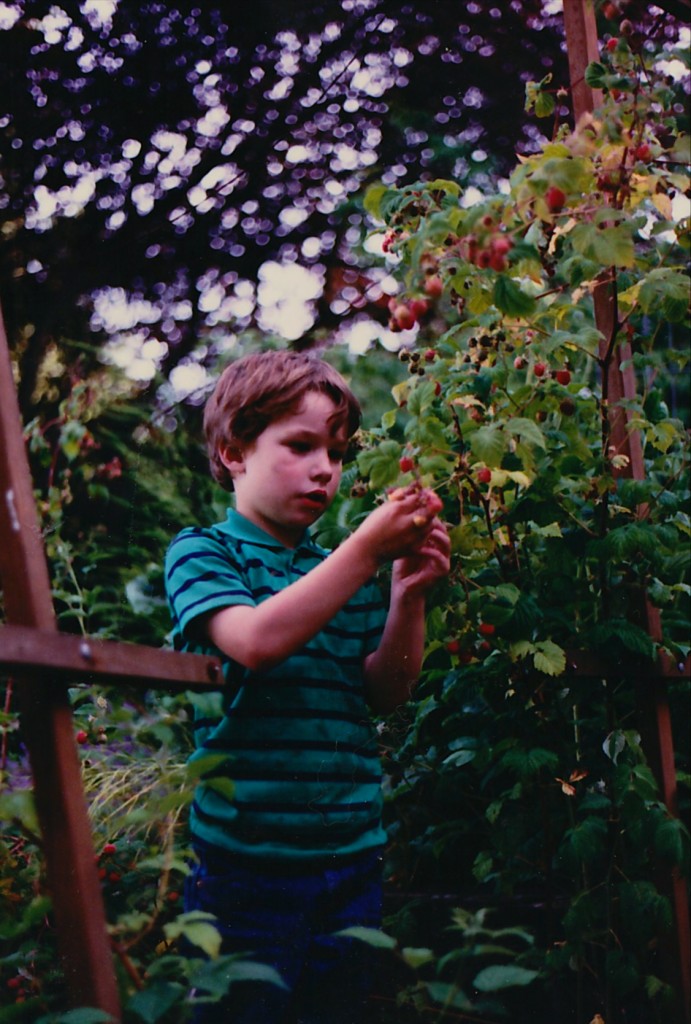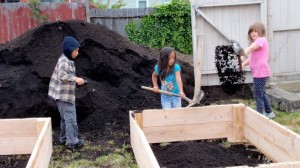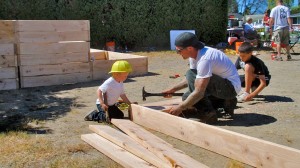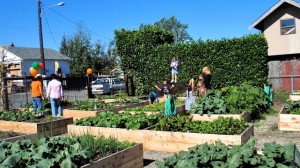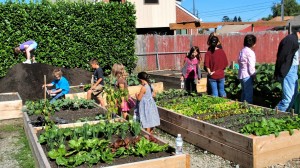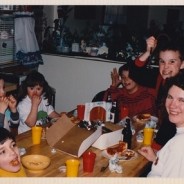Of Gardening Stores, Gardening Catalogs, and Hope
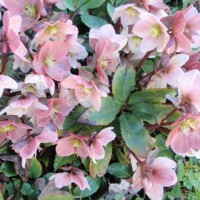
Hellebores are among the first perennials to bloom around our yard, sometimes showing their downward facing flowers as early as January in our mild maritime climate. That’s also the time that the gardening catalogs start coming in the mail, so those two harbingers of warmer, sunnier days ahead are welcome lead-ins to the promise of post-winter life. The early blooming hellebores and the garden catalogs also remind me, in a gentle and warm way, of my parents.
One of the greatest and most unexpected joys of my life occurred when my parents, then in their seventies, made a transcontinental move to be a regular part of the lives of the very young grandchildren that had finally appeared in their lives after decades of hopeful waiting. Despite their age and the necessity of their leaving behind a dense network of dear family and friends, they voluntarily, in a spirit of adventurous joy, moved from Buffalo, New York to Washington State to spend the last decade of their lives with their daughter and son and their families. As they saw it, they could finally revel in being Grandma and Grandpa to those four young children, two of them twins, all born within three years of each other.
The house my parents lived in was on our block, just a brief walk down our street and up the hill, and there in the spacious back yard my father had a raised bed garden put in so that, for the first time in his life, he would have a place (and now that he was finally retired, the time) to try his hand at being a backyard gardener. While my mother’s domain was that of annual flowers, particularly those she planted in the flower boxes which she endlessly fussed over, my father dreamed of the tomatoes, raspberries, carrots, and radishes we would harvest.
And harvest we did, though certainly not by the bushel-basket full. In any case, I loved helping him with the gardening work, and since he and I were exactly on the same page when it came to dreaming of “next year’s perfect garden” when those early spring catalogs started coming in, we ordered more gardening tools than our little raised bed garden could possibly need. (My mother had many a wry comment to make when the brown UPS truck pulled up yet again with another box she had not ordered.)
Those memories – now decades old – still warm my heart when certain triggers touch my soul. Now that it’s been such a long time since my parents were alive and able to engage in gardening activities, it is all the more precious to me to hear my father’s words in my head as new piles of the latest gardening catalogs clutter my end tables and bookshelves. “Every year is a new beginning” my father used to say, as we would freshly hope, once again, that THIS year the harvest would be totally outstanding, the weeds would be easily conquered once and for all, and nature would be nothing but provident to us, with minimal work on our part.
With that thought in my head, this past weekend I drove to three of my favorite garden stores to “look around” (always a deadly trap; see my post on Williams Sonoma as a Longing Machine). Yes, I bought a few replacement plants for patio planters now mourning the death of their last occupants, and I also bought some needed supplies as well. But what struck me most of all in each of the stores this time was not the bursting splashes of color the decorators had so carefully staged through each of the stores, though those artfully positioned displays of plant life were certainly lovely and appreciated.
No, this time what I was most drawn to notice was the intergenerational interaction I saw in each of the stores, sometimes between a parent and a small child, other times between an adult child and an older, perhaps wheelchair-using parent. In one case a little girl was excitedly calling to her parents as she ran back and forth among the herb display, particularly noticing and commenting on those that “smelled so good.” I showed her how to rub the Corsican mint gently with her finger tips and then smell her fingers. She was so delighted that she ran to let her mother and father sniff, and they, in turn, ended up buying the plant so that she could continue loving this producer of olfactory beauty in her own yard.
In other cases, I heard conversations, sometimes in English, sometimes in Chinese, sometimes in Spanish, between people I judged to be son and father, son and mother, daughter and mom. Even when I could not understand the conversation, it was easy to watch and see what was being demonstrated when a particular tool was picked up and its use was pantomimed by the adult child for the benefit of the elderly parent: “this will make things easier for you.”
Much more than when my parents were still alive, I have gotten involved, in these recent years, in campaigns to involve more people in growing their own food – or at least caring where their food comes from. My daughter-in-law and son are members of a community garden that they and others have built on one of several formerly vacant eyesore lots which the city has made available for this purpose. I take part in education efforts (both online and face-to-face with my students) about GMOs, farmers’ markets, slow food movements, and edible landscaping. I read those incoming gardening catalogs now not only with myself in mind, but also with the thought that gardening activities (e.g. saving water by xeriscape designs, replacing lawns with food gardens, involving the young generation in seed-to-meal schoolyard garden projects, getting involved in multi-generational gardening activities) can truly nurture us as whole beings, and not just hungry consumers.
And always, my father’s voice is what I hear when I feel particularly hopeful. “Every year is a new beginning.”
For Those Who Mourn…
This post should be read after first reading my post “To my cousin Kathy (August 10, 1954 – April 15, 2012)” – below) As I begin writing this in a time zone three hours behind Buffalo’s, Kathy’s funeral must be just concluding. For all of you who, like me, mourn her loss very deeply, I want to share something I discovered quite by accident on my Facebook news feed not long ago: a link to the music of Zbigniew Preisner, the premier composer of film scores in Poland today. The following two YouTube links come from Preisner’s entire hour-long work, Requiem for My Friend, a work that so moved me that I bought and downloaded the complete album, and have been listening to it on my iPod or iTunes almost nonstop for the past two weeks. The words to the first of these tracks – Lacrimosa (Latin for “weeping”) – will be instantly recognized by anyone who grew up Catholic and attended (or even sang, as part of their choir’s repertoire) the old Latin requiem mass: Lacrimosa dies illa/ Qua resurget ex favilla/ Judicandus homo reus. Huic parce Deus/Pie Jesu Domine/Dona eis requiem (Presiner’s website gives this English translation: “Ah! That day of tears of mourning!/From the dust of earth returning/ Man for judgment must prepare him. / Spare, oh God, in mercy spare him! Lord all pitying, Jesu blest. Grant them Thine eternal rest.”) The second – Kai Kairos (Greek for “time” – in a very specific, non-lineal sense; more like “window of time” or even “opportunity”) will be recognized by anyone who is familiar with the 60s folk rock hit made famous by the Byrds (originally put to music by Pete Seeger in 1959) – “Turn, Turn, Turn”. It is actually the text of a section of the Book of Ecclesiastes and it begins with the familiar words (in its English translation) “To every thing there is a season…” (see the complete lyrics and English translation on Preisner’s webpage). As an aside, I want to note how grateful I am today that, long ago, I went to Catholic school and as a matter of course there had to learn to sing the deceptively simple Gregorian chant version of the Latin requiem mass. I may no longer be a churchgoer, but I will always have that magical key to access all of the many subsequent musical creations that have, since medieval times, been woven into deeply meaningful sounds using structures provided by these formulaic words. I see these creative works as evidence of a profoundly human striving – motivated by real need – to somehow, through rituals, words, and music, make sense of death. From the furiously thunderous crashing of Verdi’s “Dies irae”, to the gorgeous baritone solo of Fauré’s “Libera Me”(which my son Anders sang as featured male soloist in his high school choir), to the almost unbearably beautiful and gentle “Pie Jesu” of Lloyd Weber’s requiem, to the minimalist and wordless renditions of other parts of the requiem mass such as the Nyman Paraphrase of the Miserere (which my saxophonist son Erik has performed) – music helps us grasp and make some sense of the deepest emotions we are capable of feeling. My father taught me that. Finally, I want to present here – for the benefit of those of us who mourn for Kathy – the words...
read moreTo My Cousin Kathy (August 10, 1954 – April 15, 2012)
Who would have predicted, 30 years ago when we were both newly pregnant with the new life that would become our first-born sons (born two days apart in the early months of 1983), that the letter-writing you started between us would grow and develop to make us so close, so verbally attuned to each others’ lives? You were the premier family correspondent, with your long, newsy letters delighting your recipients. I learned to follow your lead, attempting to match the level of detail and feeling that you put into your writing. Trying to put in words the physical pain of childbirth? Check! Sharing pictures of beaming grandparents? Check! Proudly describing our one-year old sons with the 30-word vocabularies? Both of us – check! Later there would be other topics of conversation, not always so triumphant. Your daughter’s critically necessary heart operations. Concerns about our kids making it through the teenage years. Worries about our parents’ health issues, in particular, both our fathers’ degenerative Parkinson’s symptoms, ending, several years apart, with their deaths. There was so much loving pride in your letters and emails about your children. Timmy’s starring role in his kindergarten play. Later, Timmy the trumpeter playing Beethoven’s Song of Joy at your brother’s wedding. And beyond that, Lisa’s numerous dance recitals, with you shortening all those recital costumes for her, year after year. Timmy became Tim, and your heart almost burst with pride at his musical accomplishments all through high school and at his successes in college and his graduate school degree. Lisa, guided by you and Jim, came to enjoy a social life “more active than yours”. And Billy shone in soccer, giving you countless highs as you watched and cheered him on game after game. When he left for the first time to go to New Mexico to attend Philmont Scout Camp, you bawled and hugged his pillow after dropping him off at the airport. And he too made you so proud of his successes in college and his achieving a graduate degree. And you came to love the two women – Lindsay and Donna – who would be joining your family as your future daughters-in-law. Yes, in emails that were sometimes long, sometimes quick in succession, sometimes just short little updates, we talked (and sometimes worried or even complained) endlessly about our kids, our siblings, and our families, both immediate and extended. When holidays came and we ran around, harried by our job responsibilities colliding with our needs to shop and wrap presents and plan big meal events, we often got on the computer several times a day just to vent to each other about “this craziness”. To each other, in our deliberate affirmation of each other as close and trusted confidants, you and I became at least as intimate as sisters – which, in our real families, neither of us had. Living as we did a continent apart, we only saw each other twice in the past three decades, both times occasioned by family funerals that I attended with my mother and one or both of my sons. The first of those events took place when your grandmother (my mother’s sister) lost her oldest son, Len. Our kids were all together for the first and only time then, eating pizza in your kitchen....
read moreZbigniew Preisner’s album – Requiem for My Friend (1:07:29)
From Preisner’s website: “Once, we had a joint conception to create a concert telling a life story. The premiere was planned to take place on the Acropolis in Athens. It was intended to be a large event, a hybrid of a mystery play and an opera. Krzysztof Kieślowski would be the director, Krzysztof Piesiewicz was responsible for the script, and I was planning to compose the music. “Once, we thought it might be the first of a series of musical performances, to be developed in various interesting places around the world in the next few years. “But it was life that authored a different ending: Krzysztof Kieślowski died on 13th March 1996. “The first part of Requiem for my friend is meant as a farewell to Krzysztof Kieślowski. “I dedicate this music to him.” Zbigniew Preisner album released 16 May 2011 Tracks: Officium – 00:00 Kyrie eleision – 3:56 Dies irae – 9:46 Offertorium – 14:40 Sanctus – 17:37 Agnus Dei – 20:46 Lux aeterna (Światłość wiekuista niechaj mu świeci) – 22:26 Lacrimosa – 24:22 Epitaphium – 27:40 Meeting – 30:40 Discovering the World – 35:59 Love – 38:42 Kai Kairos (Ecclesiastes 3, 1-8) – 41:07 Ascende huc – 50:48 Veni et vidi – 53:04 Qui erat et qui est – 55:46 Lacrimosa – 1:00:12 Prayer (Panie Boże wspomóż nas – 1:04:15 Lyrics (in Latin, Greek, Polish, and English translations) are...
read more
